theartsdesk in Artvin: A Film Festival on Wheels | reviews, news & interviews
theartsdesk in Artvin: A Film Festival on Wheels
theartsdesk in Artvin: A Film Festival on Wheels
Young Turks take the cinema to far-flung places
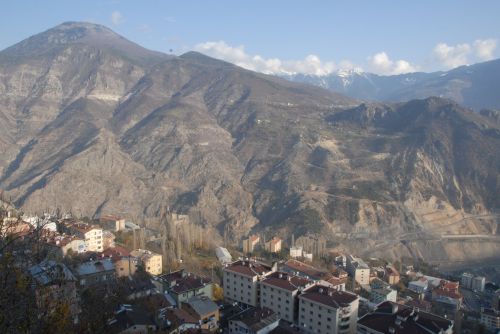 Search for Artvin (left, photo: Murat Kocaağa) on English-language Google and you won't turn up much. Claimed by successive waves of occupiers from the Ottomans onwards until it devolved to Turkey in 1921, the town once flourished as a cool summer resort for its colonisers. Today, though, the swanky dachas have crumbled and, aside from its astonishing natural beauty, the place seems known chiefly for trekking, bull fighting, bear hunting and apparently (there's no tactful way round this) sex traffic. "Artvin has been dubbed ‘one large brothel'," asserts my Lonely Planet guide baldly, though to be fair it's a 1996 edition.
Search for Artvin (left, photo: Murat Kocaağa) on English-language Google and you won't turn up much. Claimed by successive waves of occupiers from the Ottomans onwards until it devolved to Turkey in 1921, the town once flourished as a cool summer resort for its colonisers. Today, though, the swanky dachas have crumbled and, aside from its astonishing natural beauty, the place seems known chiefly for trekking, bull fighting, bear hunting and apparently (there's no tactful way round this) sex traffic. "Artvin has been dubbed ‘one large brothel'," asserts my Lonely Planet guide baldly, though to be fair it's a 1996 edition.
For a week in mid-December, none of the above is in evidence. The bulls are in their winter quarters, the bears are in hibernation and the prostitutes - if they exist - are either in mufti or have gone to ground for the duration. Instead, there is art of the filmic variety in Artvin; and there is even wine, for the locals apply a liberal interpretation to Islamic practice, not to mention to Turkey's stringent anti-smoking laws. For seven days, the Festival on Wheels is in town.
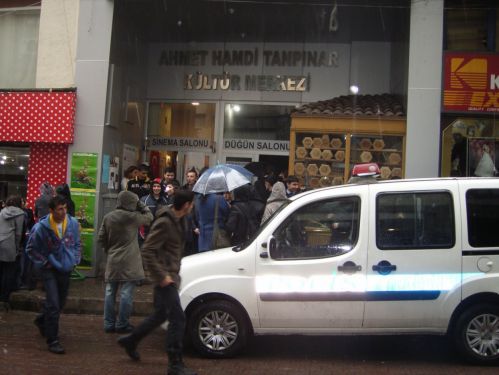 The nights draw in early in Artvin, which shares the same time zone as Istanbul but is 800 miles due east (even further from the tourist honeypots of the Aegean coast): view its location here on Multimap. One afternoon earlier this week, a minor riot erupted in the winter half-light outside the Cultural Centre, which had been converted into a cinema for the occasion (right, photo: Sheila Johnston). There was no red carpet - the rain and sleet would make short work of it - but a sense of driving urgency as teenagers fought to get into a screening of François Ozon's contentious 1998 film Sitcom. Later, schoolchildren at Castaway on the Moon, a very adult black comedy from Korea, tugged at my sleeve, keen to practise their English (the local literacy rate is 90 per cent, comfortably above the national average).
The nights draw in early in Artvin, which shares the same time zone as Istanbul but is 800 miles due east (even further from the tourist honeypots of the Aegean coast): view its location here on Multimap. One afternoon earlier this week, a minor riot erupted in the winter half-light outside the Cultural Centre, which had been converted into a cinema for the occasion (right, photo: Sheila Johnston). There was no red carpet - the rain and sleet would make short work of it - but a sense of driving urgency as teenagers fought to get into a screening of François Ozon's contentious 1998 film Sitcom. Later, schoolchildren at Castaway on the Moon, a very adult black comedy from Korea, tugged at my sleeve, keen to practise their English (the local literacy rate is 90 per cent, comfortably above the national average).
The Turkish cinema is in rude health: between 70 and 80 films were produced this year, and it accounts for well over half the domestic box-office (paradoxically, the number of movie theatres, at present 1679 screens, is declining fast). 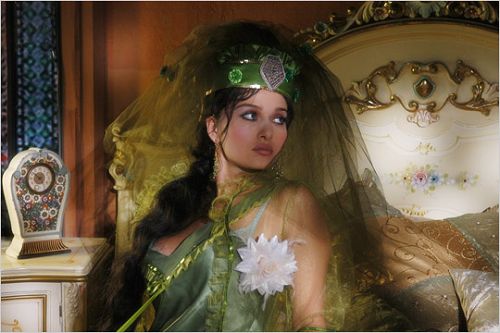 But the selection at Artvin spanned everything from local comedies, like the commedia dell'arte musical burlesque Hürmüz and her 7 Husbands (pictured left), which opened the festival, to contemporary world cinema (Ken Loach's Looking For Eric). There were classics such as Luis Buñuel'sThe Discreet Charm of the Bourgeoisie, short films from Brazil, a Lithuanian avant-garde programme and a section devoted to polemical films simply and rather splendidly titled "Anti".
But the selection at Artvin spanned everything from local comedies, like the commedia dell'arte musical burlesque Hürmüz and her 7 Husbands (pictured left), which opened the festival, to contemporary world cinema (Ken Loach's Looking For Eric). There were classics such as Luis Buñuel'sThe Discreet Charm of the Bourgeoisie, short films from Brazil, a Lithuanian avant-garde programme and a section devoted to polemical films simply and rather splendidly titled "Anti".
There is nothing new about this concept, of course. In the early 20th century travelling cinemas were a popular fairground attraction in Europe and America. Today they still tour far-flung places, from India to North-East Brazil, with a role to play in every country where the arts are over-centralised. That certainly applies to Turkey, where the unifying iron hand of Mustafa Kemal Atatürk is still manifest, and culture gravitates irresistibly towards Istanbul (even Ankara, the capital, seems provincial, its inhabitants say). But it is equally true of, say, the Australian bush or the Scottish Highlands and Islands. And Tilda Swinton and the critic/film-maker Mark Cousins towed a portable cinema all around the West Coast of Scotland last summer.
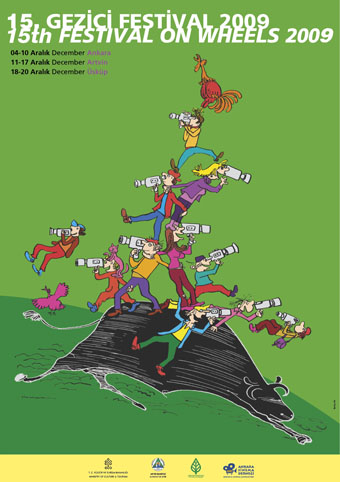 The Festival on Wheels is unlike any of these. This is not just a question of rolling in, screening a film and smartly moving on. This is the full monty; a festival lock, stock and barrel. The movies - 29 features and several dozen shorts - are shown not on DVD, as I had assumed, but on subtitled 35mm prints. A little minibus had toiled up the mountain loaded with them (the trip from Ankara took 24 hours). Enthused by the prospect of hosting the festival, the municipality had equipped its cultural centre - whose modest facade conceals a capacious interior with 440 raked seats - with a projector and Dolby stereo. Voilà: a perfectly serviceable cinema.
The Festival on Wheels is unlike any of these. This is not just a question of rolling in, screening a film and smartly moving on. This is the full monty; a festival lock, stock and barrel. The movies - 29 features and several dozen shorts - are shown not on DVD, as I had assumed, but on subtitled 35mm prints. A little minibus had toiled up the mountain loaded with them (the trip from Ankara took 24 hours). Enthused by the prospect of hosting the festival, the municipality had equipped its cultural centre - whose modest facade conceals a capacious interior with 440 raked seats - with a projector and Dolby stereo. Voilà: a perfectly serviceable cinema.
The event has an international jury with a Golden Bull to bestow, and international delegates from as far afield as Korea and Brazil. A student workshop will produce a documentary to record the occasion. It has a delightful trailer. It has a poster (right) designed by one of Turkey's leading cartoonists, Behiç Ak. It has a daily newspaper, albeit printed on an elderly press (below left, photo: Murat Kocaağa). What's more, the Festival on Wheels has been on the road, running on a shoestring, for a full 15 years. You have to be inspired to do this, tirelessly energetic and definitely a little mad.
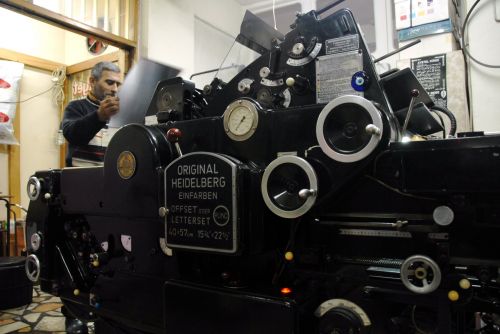 Another question: "Why Artvin?" Over the years the Festival on Wheels has had numerous bases, including Eskişehir and Bursa, both in north-west Turkey, and most recently Kars, 100 miles south-east of Artvin, until last year the event was cancelled by Kars's incoming mayor, a member of the Islamist Justice and Development Party which has been in power since 2002.
Another question: "Why Artvin?" Over the years the Festival on Wheels has had numerous bases, including Eskişehir and Bursa, both in north-west Turkey, and most recently Kars, 100 miles south-east of Artvin, until last year the event was cancelled by Kars's incoming mayor, a member of the Islamist Justice and Development Party which has been in power since 2002.
The festival's founders, Başak Emre and Ahmet Boyacıoğlu, cast around for a new host. Half a dozen mayors were solicited, unsuccessfully; it was, they say, very, very difficult, "The mayors were afraid," recalls Emre, the festival's unfeasibly glamorous director (below right, photo: Murat Kocaağa). "Afraid of the public's reactions, politically and religiously." Artvin sits at a safe distance from the powder keg of the Kurdish region in the South-East but, all the same, to import a ready-made festival from outside is to court uncertainty and dissent: "We support some of your ‘Anti' section, but not all," advised one Artvin politician, who wondered why the programme included films against sexism.
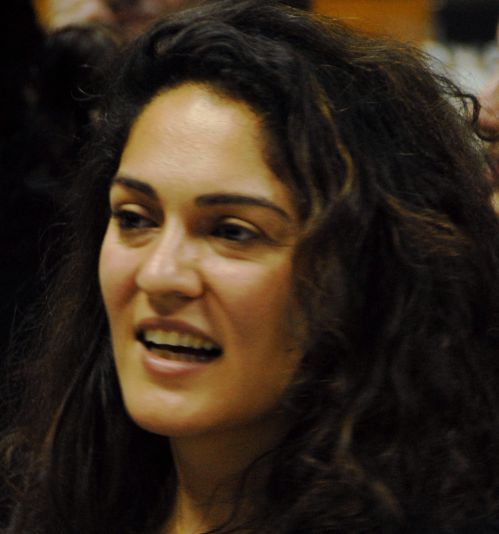 Still, what better marketing opportunity to promote the town as a tourist destination and the sensational landscapes as a film location? What better way to fill all those empty hotel rooms in the middle of winter? 60 per cent of visitors to the region come from within Turkey; at the tourist office, a tiny, spartan place secreted away down a side street, I'm told that precisely 345 Brits visited Artvin last year. Some room for expansion there, surely. The province suffers from its extreme isolation. The population is in slow decline, with an Artvinian diaspora scattered throughout Turkey. The cost of living is high. But the region is changing. Dramatic dams are under construction and will in time provide 20 per cent of the country's electricity.
Still, what better marketing opportunity to promote the town as a tourist destination and the sensational landscapes as a film location? What better way to fill all those empty hotel rooms in the middle of winter? 60 per cent of visitors to the region come from within Turkey; at the tourist office, a tiny, spartan place secreted away down a side street, I'm told that precisely 345 Brits visited Artvin last year. Some room for expansion there, surely. The province suffers from its extreme isolation. The population is in slow decline, with an Artvinian diaspora scattered throughout Turkey. The cost of living is high. But the region is changing. Dramatic dams are under construction and will in time provide 20 per cent of the country's electricity.
On my final evening, I spoke briefly with the Mayor of Artvin, Emin Özgün, a regular, genial presence at the dinners and late-night drinking parties. The festival definitely seemed to be a success in his book: "These are good people," he declared, flushed and beaming, before setting down his glass of red wine to spin a giddy round or two with the local folklore dancing troupe. But what happens when all the excitement is over and the caravan moves on? Well, Eskişehir and Bursa have started their own film festivals. Kars has its own cinema, and now Artvin has one too. When the Festival on Wheels is no longer required there, it will have fulfilled its mission.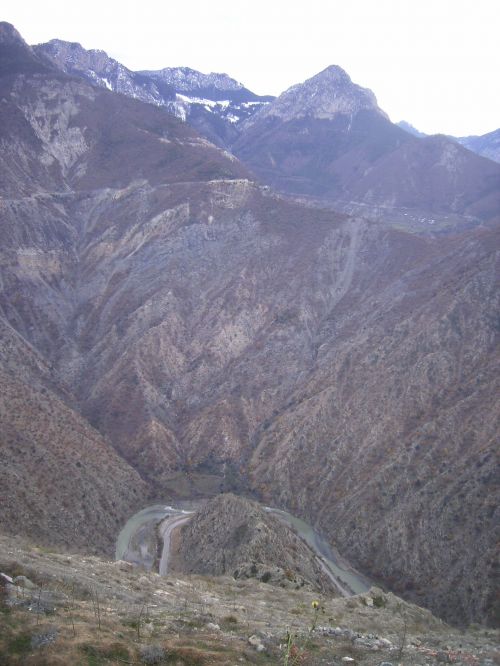 The next morning, as we trundled back to Trabzon down the mountain road (left, photo: Sheila Johnston) while dawn broke over the tea fields, I reflected on the fiery dedication of the organisers and the humbling enthusiasm of its audiences. As Turkey continues its long, forlorn petition for European Union membership (a petition that the left-wing intellectuals I spoke with eyed, in any case, with mixed feelings), the Festival on Wheels betokens people's hunger, in the very remotest corners of the country, to seek out and commune with the wider world.
The next morning, as we trundled back to Trabzon down the mountain road (left, photo: Sheila Johnston) while dawn broke over the tea fields, I reflected on the fiery dedication of the organisers and the humbling enthusiasm of its audiences. As Turkey continues its long, forlorn petition for European Union membership (a petition that the left-wing intellectuals I spoke with eyed, in any case, with mixed feelings), the Festival on Wheels betokens people's hunger, in the very remotest corners of the country, to seek out and commune with the wider world.
more Film
 Fantastic Machine review - photography's story from one camera to 45 billion
Love it or hate it, the photographic image has ensnared us all
Fantastic Machine review - photography's story from one camera to 45 billion
Love it or hate it, the photographic image has ensnared us all
 All You Need Is Death review - a future folk horror classic
Irish folkies seek a cursed ancient song in Paul Duane's impressive fiction debut
All You Need Is Death review - a future folk horror classic
Irish folkies seek a cursed ancient song in Paul Duane's impressive fiction debut
 If Only I Could Hibernate review - kids in grinding poverty in Ulaanbaatar
Mongolian director Zoljargal Purevdash's compelling debut
If Only I Could Hibernate review - kids in grinding poverty in Ulaanbaatar
Mongolian director Zoljargal Purevdash's compelling debut
 The Book of Clarence review - larky jaunt through biblical epic territory
LaKeith Stanfield is impressively watchable as the Messiah's near-neighbour
The Book of Clarence review - larky jaunt through biblical epic territory
LaKeith Stanfield is impressively watchable as the Messiah's near-neighbour
 Blu-ray/DVD: Priscilla
The disc extras smartly contextualise Sofia Coppola's eighth feature
Blu-ray/DVD: Priscilla
The disc extras smartly contextualise Sofia Coppola's eighth feature
 Back to Black review - rock biopic with a loving but soft touch
Marisa Abela evokes the genius of Amy Winehouse, with a few warts minimised
Back to Black review - rock biopic with a loving but soft touch
Marisa Abela evokes the genius of Amy Winehouse, with a few warts minimised
 Civil War review - God help America
A horrifying State of the Union address from Alex Garland
Civil War review - God help America
A horrifying State of the Union address from Alex Garland
 The Teachers' Lounge - teacher-pupil relationships under the microscope
Thoughtful, painful meditation on status, crime, and power
The Teachers' Lounge - teacher-pupil relationships under the microscope
Thoughtful, painful meditation on status, crime, and power
 Blu-ray: Happy End (Šťastný konec)
Technically brilliant black comedy hasn't aged well
Blu-ray: Happy End (Šťastný konec)
Technically brilliant black comedy hasn't aged well
 Evil Does Not Exist review - Ryusuke Hamaguchi's nuanced follow-up to 'Drive My Car'
A parable about the perils of eco-tourism with a violent twist
Evil Does Not Exist review - Ryusuke Hamaguchi's nuanced follow-up to 'Drive My Car'
A parable about the perils of eco-tourism with a violent twist
 Io Capitano review - gripping odyssey from Senegal to Italy
Matteo Garrone's Oscar-nominated drama of two teenage boys pursuing their dream
Io Capitano review - gripping odyssey from Senegal to Italy
Matteo Garrone's Oscar-nominated drama of two teenage boys pursuing their dream
 The Trouble with Jessica review - the London housing market wreaks havoc on a group of friends
Matt Winn directs a glossy cast in a black comedy that verges on farce
The Trouble with Jessica review - the London housing market wreaks havoc on a group of friends
Matt Winn directs a glossy cast in a black comedy that verges on farce

Add comment